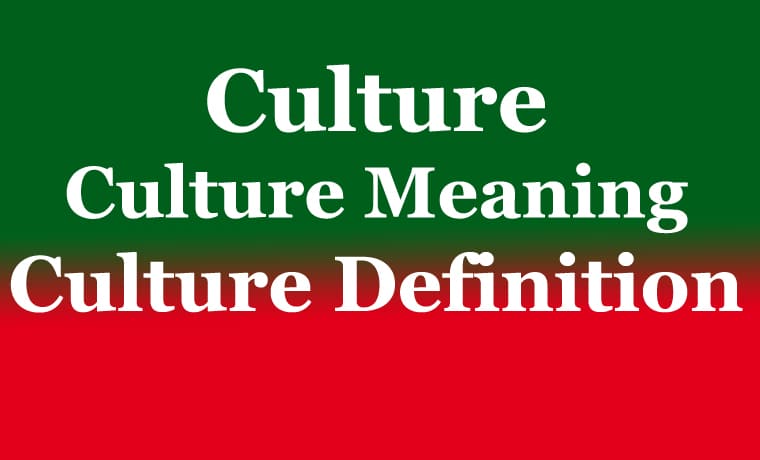“Uncover the essence of culture in our in-depth exploration. From its definition and synonyms to its antonyms and broader implications, discover how culture shapes societies and influences human interactions across the globe.”
Culture | Culture Meaning | Culture Definition
(Culture: Understanding Its Meaning, Forms, and Significance)
Introduction
Culture is a complex and multifaceted concept that plays a crucial role in shaping our societies and personal identities. Understanding culture is essential for appreciating the diversity and richness of human life. In this article, we will explore the meaning of ‘culture,’ its various forms, and its significance in our lives.
Meaning of ‘Culture’
The word ‘culture’ has its roots in the Latin word ‘cultura,’ which means cultivation or tending. Over time, the meaning of culture has expanded to encompass the social behaviors, norms, beliefs, and practices that define a particular group of people or society. In essence, culture is the collective programming of the mind that distinguishes one group from another.
Usage of ‘Culture’ in a Sentence
To better understand the word ‘culture,’ let’s see it in a sentence:
“The culture of Japan is known for its emphasis on harmony, respect, and tradition.”
Forms of the Word ‘Culture’
Verb Form: The verb form of ‘culture’ is ‘to culture,’ which means to cultivate or nurture.
– Example: “Scientists culture cells in a laboratory to study their growth.”
Adjective Form: The adjective form is ‘cultural,’ which relates to culture or cultivation.
Example: “The cultural festival showcased traditional dances and music from around the world.”
Other Forms: Other forms include ‘cultured’ (adjective) and ‘culturing’ (verb, present participle).
Synonyms of ‘Culture’
Some synonyms of ‘culture’ include:
Civilization
Society
Heritage
Tradition
Customs
Using synonyms in sentences:
“The civilization of ancient Egypt left a lasting legacy in art and architecture.”
“Every society has its own unique traditions and customs.”
Antonyms of ‘Culture’
Some antonyms of ‘culture’ are:
Barbarism
Uncultured
Ignorance
Using antonyms in sentences:
“Barbarism often leads to the destruction of cultural heritage.”
“An uncultured approach to life neglects the importance of art and education.”
Essay on ‘Culture’
Introduction
Culture is the backbone of any society, influencing how people think, behave, and interact with one another. It encompasses the arts, beliefs, customs, institutions, and all other products of human work and thought.
Historical Perspective
Historically, culture has been passed down from generation to generation, preserving the wisdom and experiences of ancestors. Early human societies used storytelling, rituals, and art to transmit their cultural values and knowledge.
Components of Culture
Language:
Language is a fundamental component of culture, serving as a medium for communication and a carrier of cultural knowledge. Each language carries with it the worldview of its speakers.
Customs and Traditions
Customs and traditions are the practices and rituals that are unique to a particular culture. They provide a sense of identity and continuity for communities.
Arts and Literature
Arts and literature reflect the creative expression of a culture. They capture the imagination, values, and experiences of a society.
Religion and Beliefs
Religion and beliefs form the moral and spiritual foundation of many cultures. They influence behavior, ethics, and the meaning of life.
The Role of Culture in Society
Influence on Behavior
Culture shapes the behavior of individuals by providing guidelines and norms. It influences how people dress, speak, and interact with one another.
Shaping Identity
Culture is integral to personal and group identity. It gives individuals a sense of belonging and purpose within their community.
Promoting Unity and Diversity
Culture promotes unity by bringing people together through shared practices and values. At the same time, it celebrates diversity by acknowledging and respecting differences.
Culture in the Modern World
Globalization and Cultural Exchange
Globalization has led to increased cultural exchange, where ideas, customs, and practices are shared across borders. This has enriched cultures but also posed challenges to preserving traditional identities.
The Impact of Technology
Technology has transformed how culture is created and consumed. Social media, digital art, and online communities have become new avenues for cultural expression.
Preserving Cultural Heritage
Preserving cultural heritage is vital for maintaining the identity and history of a society. Museums, cultural centers, and educational programs play a crucial role in this effort.
Challenges to Culture
Cultural Erosion
Cultural erosion occurs when traditional practices and values are lost, often due to modernization and globalization. This can lead to a loss of identity and heritage.
Cultural Misunderstanding
Cultural misunderstandings arise when different cultural norms and values clash. This can lead to conflicts and miscommunication.
Balancing Tradition and Modernity
Balancing tradition and modernity is a challenge for many cultures. While modernization brings progress, it is important to preserve the essence of traditional practices.
Conclusion
Culture is the lifeblood of human societies, providing a framework for social interaction, personal identity, and collective unity. Understanding and appreciating culture is essential for fostering a more harmonious and inclusive world.
FAQs on Culture
What is the simplest definition of culture?
Culture refers to the shared beliefs, practices, norms, and values of a group of people.
How does culture influence behavior?
Culture influences behavior by providing guidelines and norms that shape how individuals think, act, and interact with others.
Can culture change over time?
Yes, culture can change over time due to factors like globalization, technology, and social movements.
Why is it important to preserve culture?
Preserving culture is important for maintaining a society’s identity, history, and heritage.
How does globalization affect culture?
Globalization affects culture by facilitating cultural exchange, which can lead to both the enrichment and erosion of traditional practices and values.
To Sum up, culture, at its core, encompasses a vast array of synonyms that encapsulate the richness and diversity of human societies’ shared customs, traditions, and expressions. One synonymous term often used to describe this collective identity is “heritage.” Heritage denotes the inheritance of beliefs, practices, and values passed down through generations, shaping societal norms and individual identities alike.
Another synonym that resonates deeply with the concept of culture is “tradition.” Traditions are rituals, customs, and behaviors that form the bedrock of a community’s social fabric, providing continuity and a sense of belonging across time and space. They embody collective memories and narratives that bind individuals together in shared experiences.
“Ethos” is a synonym that emphasizes the guiding principles and values that define a group or society. It encompasses the moral, ideological, and philosophical foundations that influence behaviors, attitudes, and societal norms. Ethos reflects the collective mindset and worldview of a community, guiding its interactions and shaping its identity.
The term “lifestyle” also serves as a synonym for culture, highlighting the patterns of behavior, consumption, and social practices that characterize a particular group or society. Lifestyle encompasses everything from daily habits and leisure activities to fashion choices and dietary preferences, reflecting cultural norms and individual preferences.
Moreover, “civilization” denotes the advanced state of human social development, encompassing cultural achievements in art, science, governance, and technology. It signifies the collective progress and achievements of societies in shaping their environments and advancing human knowledge and creativity.
Lastly, “way of life” encapsulates the broader aspects of culture, encompassing not only tangible customs and traditions but also intangible values, beliefs, and worldviews that inform individuals’ daily lives and societal structures. It encompasses the totality of human experiences, from social interactions and economic activities to spiritual beliefs and artistic expressions.
In conclusion, these synonyms offer a nuanced understanding of the multifaceted nature of culture, emphasizing its dynamic and evolving characteristics across different societies and historical contexts. They underscore the significance of shared beliefs, practices, and values in shaping identities, fostering community cohesion, and enriching the tapestry of human experience.
By understanding culture, we can appreciate the diversity and richness of human experiences and work towards a more inclusive and respectful world. 0 0 0.
American Culture
American culture is a vibrant tapestry woven from diverse threads of history, immigration, innovation, and social change. It is a complex and dynamic amalgamation of traditions, values, beliefs, and lifestyles that have evolved over centuries, shaped by varied influences.
One of the defining characteristics of American culture is its diversity. The United States is often described as a melting pot, where people from all corners of the globe have come together, bringing their languages, religions, cuisines, and customs. This diversity has not only enriched American culture but has also challenged and expanded its boundaries, creating a unique blend of traditions and perspectives.
Religious diversity is a prominent feature of American culture, with Christianity being the predominant faith but with significant populations of Jews, Muslims, Buddhists, Hindus, and adherents of other religions. This religious pluralism has fostered a spirit of tolerance and religious freedom that is enshrined in the Constitution.
The arts and entertainment industries play a decisive role in shaping American culture and influencing global trends. Hollywood, located in Los Angeles, California, is synonymous with the American film industry and has produced iconic movies and television shows that have captivated audiences worldwide. American music, ranging from jazz and blues to rock and hip-hop, has also had an indepth impact on global popular culture.
Sports are another integral part of American culture, with American football, basketball, baseball, and soccer (football) capturing the nation’s passion and loyalty. Sporting events like the Super Bowl and the World Series attract millions of viewers and foster a sense of community and national pride.
American cuisine reflects the country’s diverse immigrant heritage and regional variations. From New England seafood dishes to Tex-Mex cuisine and Southern comfort food, American gastronomy is as diverse as its population.
The concept of the “American Dream” has been a driving force in American culture, symbolizing the belief that anyone, regardless of background or social status, can achieve success and prosperity through hard work and determination. This ethos has shaped the national identity and contributed to a culture of entrepreneurship, innovation, and ambition.
Social movements and activism have also played a pivotal role in shaping American culture, from the Civil Rights Movement of the 1960s to contemporary movements advocating for gender equality, LGBTQ+ rights, environmental sustainability, and racial justice. These movements have challenged societal norms, spurred legislative change, and fostered a spirit of civic engagement and social responsibility.
Despite its strengths, American culture is not without its challenges and contradictions. Issues such as racial inequality, political polarization, economic disparities, and debates over immigration and national identity continue to shape the cultural landscape and influence public discourse.
In conclusion, American culture is a multifaceted mosaic characterized by diversity, creativity, resilience, and a commitment to democratic ideals. It continues to evolve and adapt to new challenges and influences while retaining core values and traditions that define the American experience. As the world becomes increasingly interconnected, American culture remains a powerful force in shaping global trends and influencing societies around the world. 0 0 0.
Books of Composition by M. Menonimus:
Some Books For Students
- Advertisement Writing
- Amplification Writing
- Note Making
- Paragraph Writing
- Notice Writing
- Passage Comprehension
- The Art of Poster Writing
- The Art of Letter Writing
- Report Writing
- Story Writing
- Substance Writing
- School Essays Part-I
- School Essays Part-II
- School English Grammar Part-II..
Books of S. Story by M. Menonimus:
- The Fugitive Father and Other Stories
- The Prostitute and Other Stories
- Neha’s Confession
- Juvenile Stories and Essays
Books of Biography by M. Menonimus:
- The World Writers-Brief Biographies
- Introduction to World Writers
- Introduction to World Personalities
- Love of Reputed Persons
- Brief Biographies of Prominent Bengali Writers
- Brief Biographies of Eminent Monarchs
- Brief Biographies of Ancient Thinkers and Writers
- Brief Biographies of Eminent Generals and Conquerors
- Biographies of Writers Around the World
- Introduction to Men of Letters ..
Books on Linguistics by M. Menonimus:
- A Brief History of the English Language
- Essays on Linguistics
- My Imageries
- Felicitous Expression: Some Examples
- Learners’ English Dictionary
Books of Literary Criticism by M. Menonimus:
- World Short Story Criticism
- World Poetry Criticism
- World Drama Criticism
- World Novel Criticism
- World Essay Criticism
- Indian English Poetry Criticism
- Indian English Poets and Poetry Chief Features
- Emily Dickinson’s Poetry-A Thematic Study
- Walt Whitman’s Poetry-A Thematic Study
- Critical Essays on English Poetry
- Tawfiq al-Hakim’s Novel: Return of the Spirit-An Analytical Study
- Tawfiq al-Hakim’s Novel: ‘Yawmiyyat Naib Fil Arayaf’-An Analytical Study
- Analytical Studies of Some Arabic Short Stories
- A Brief History of Arabic Literature: Pre-Islamic Period (500 AD-622 AD)
- A Brief History of Arabic Literature: Early Islamic Period (622 AD-661 AD)
- Reviews on William Shakespeare’s Works
- Reviews of Charles Dickens’ Works
- Reviews of John Milton’s Literary Works
- Reviews of Some Iconic Travelogues
- Shakespeare’s Sonnets-Critical Studies
- Analytical Studies of Selected Poems of Sarojini Naidu
- Analytical Studies of Selected Poems of Rabindranath Tagore
- Analytical Studies of Selected Indian English Poems
- Reviews of Selected Motivational Books
- Origin Evolution & Functions of Literature
- Essays on Shakespeare and His Time …
Books of Poetry by M. Menonimus :
- Rainbow Tomorrow Night
- A Heart Full of Golden Hopes
- Evergreen Loves
- For My Countrymen
- If You Go Away
- In Search of a White Heart
- In the Light of Candle
- In the River of Blood
- Lovelia
- My Dear a Heart
- My Native Land
- The Lost Reminiscence
- Under the Starry Sky
- The Little Girl and the Stars
- Loves and Songs
- My Casual Poems
- An Orphan and Other Poems in Prose
Books of Essay by M. Menonimus:
- Love Letters to Liza
- Let’s Look Into
- Essays on Science and Technology
- Articles on Contemporary Affairs
- Gleaned Essays
Books on Science and Technology by M. Menonimus:











